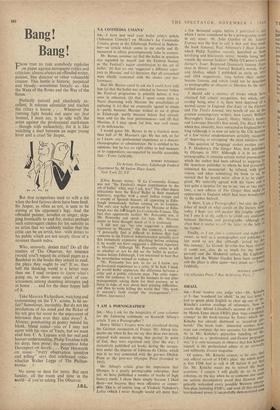'I AM A PORNOGRAPHER' Sin,—May I ask for the hospitality
of your columns for the following comments on Kenneth Allsop's article 'I am a Pornographer'?
Henry Miller's Tropics were not circulated during the German occupation of France. Mr. Allsop mis- quotes me when he has me say that these two novels enjoyed wide success during that period. In point of fact, they were reprinted only after the war; exclusively published art books during thc occupa- tion under the imprint of Editions du Chanc, which was in no way connected with the pre-war Obelisk Press or the post-war Olympia Press (founded in 1953).
Mr. Allsop's article gives the impression that
Olympia is a published pornographic enterprise, And yet, we have published a number of books of high literary merit; I chose them simply because I liked them—not because they were offensive or censor- able. This is, of course, true, of Vladimir Nabokov's Lolita (which I never thought would sell more than a few thousand copies before I published it and which I never considered to be a pornographic novel in any sense: Mr. John Gordon of the Sunday Express was the first to call it that and thus made the book famous); Paul Ableman's I Hear Voices. which Philip Toynbee recently described as 'both terrifying and hilariously funny,' besides being 'well outside the current fashion'; Philip O'Connor's novel Steiner's Tour; Raymond Queneau's fantasy Zave dans le Mdtro; and Samuel Beckett's novels, WWI and Molloy, which I published as early as 1953 and 1954 respectively, long before their author became famous, and which could not be described as pornographic or obscene or libertine by the most exalted censor.
I should add a number of books which have obtained full critical recognition, but which, ea' sorship being what it is, have been deprived of a normal career in England. Our Lady of the Flowers and The Thief's Journal, two novels of one of the greatest contemporary writers, Jean Genet; William Burroughs's Naked Lunch; Henry Miller's boast and Lawrence Durrell's first novel, The Black 11001" which has, absurdly, been ostracised in England for s° long (although it is now on sale in the US) because of a few verbal misdemeanours certainly incapable of 'depraving or corrupting' the most sensitive soul' This question of 'language' evokes another case:, J. P. Donlcavy's The Ginger Man, first published by Olympia in 1955. Although it is in no sense pornographic, it contains certain verbal provocations S which the author had been advised to suppress the American publisher to whom he had previous') submitted his manuscript: he refused, with good reason, and when submitting his book to us, he insisted that he would never allow it to be exPtlf. gated. We naturally agreed with his views and tt was quite a surprise for me to see, one or two years
.
later, a new edition of The Ginger Man make appearance in England which had been bowdlerised by the author himself. In short, 'I am a Pornographer'; but also the Pub: lisher of much of what counts on the literary se°11 today. I hope you will pardon this lengthy exPo.s''' but I owe it to an authors to avoid any confusion between literature and pornography—although 0`, often find it useful to call the latter to the help °I the former. Finally, as I am also a restaul.ant and night-club owner, as well as a pornographer and publisher; last word to say that although 'gutted by .4,r,u this summer,' La Grande Severine has been revivt- (I could not,„ alas, do as much for my twentyY parrots) and the Mediaeval cellars, the CaeltostrA Salon and the Winter Garden have been reoperte' and the place is alive again—very much so.—Yours faithfully, nrsrrtu I 01120)05 T he Olympia Press, 7 Rue St-Severin. l'ari■. 5














































 Previous page
Previous page